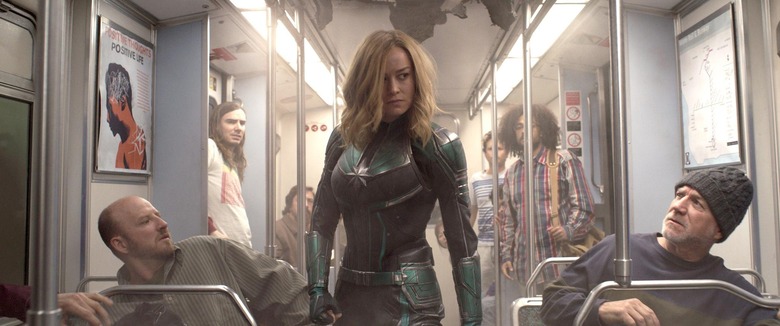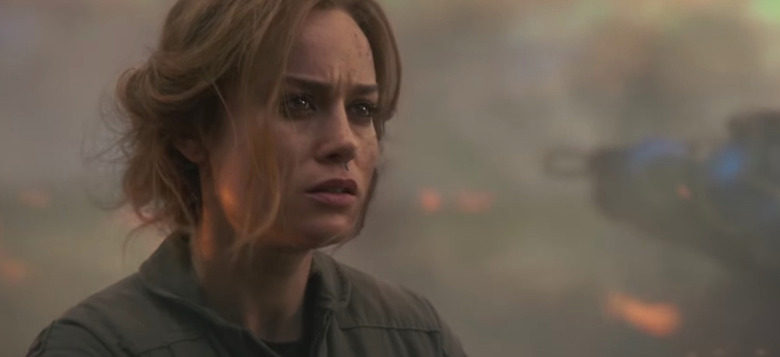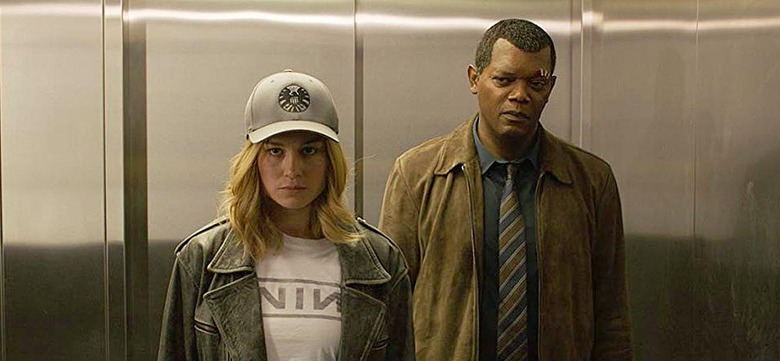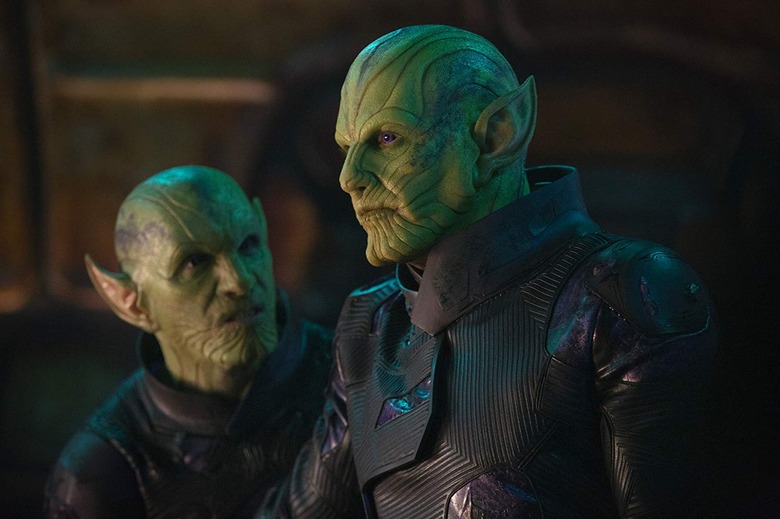Road To Endgame: 'Captain Marvel' Is A Quintessential Marvel Movie – And That's Not Always A Good Thing
(Welcome to Road to Endgame, where we revisit the first 22 movies of the Marvel Cinematic Universe and ask, "How did we get here?" In part one of our two-part look at Captain Marvel: how the movie tries, and fails, to frame memory and perspective.)Between the two halves of its massive finale — the apocalyptic Avengers: Infinity War and the upcoming Avengers: Endgame — the Marvel Cinematic Universe feels like it's being stripped for parts.Ant-Man and the Wasp, a smaller, more intimate entry, did away with the trappings of the Marvel formula, though it failed to supply a working substitute. Its leads no longer provided quip-laden momentum (a task that fell to supporting players independent of the plot), but the lead characters had no internal conflict either, despite pasts that so clearly called for some. The film sidestepped the usual pre-visualized mayhem divorced from story, though its climax might as well have had no stakes at all. And rather than Marvel's half-hearted expression of meaning — often a character arc culminating in punching harder — the film had no real theme to dramatize. Captain Marvel, on the other hand, is a swing in the opposite direction, amping up the well-worn Marvel template to the point of inducing whiplash. It's fun in parts, and it magnifies the series' strong-suits; though in doing so, it exposes just how low the bar was set to begin with. The film can't help but magnify the series' weaknesses too, since they're often one and the same.Everything that was missing from Ant-Man and the Wasp comes rushing back, with the studio's very name stamped across the title, as if to parody the common through-lines of twenty prior films without the self-awareness to do so. And while it's filled to the brim with metaphor and ostensibly political outlook, the film is both haphazardly assembled, and shackled by the same constraints as fellow military-funded entries Iron Man, Iron Man 2 and Captain America: The Winter Soldier. Only this time, the effects of the film's mandated propaganda are significantly stronger.Captain Marvel is a Marvel movie through-and-through, and that's a problem.
Oh! Carol
After a tumultuous comic book history, Carol Danvers (then Ms. Marvel) rejoined the Marvel A-list in 2006, before graduating to the "Captain" mantle six years later. Brie Larson brings a combination of wit and gravitas to the character, and a self-assured demeanour that captures Danvers' recent incarnations. The problem however, is that the Danvers of the comics — a headstrong leader with agreeable charm — builds on decades of stories, absorbing the ones that work while subverting those that don't. Whereas the Danvers of the movie, the amnesiac "Vers," is an awkward fit for a story about someone still trying to find her place.Wit and charm aren't just this Danvers' affectations. They're her equilibrium from start to finish, despite the film being about her losing and subsequent re-discovering her identity on Earth.In an early training scene on Hala, the Kree home world and the only place Danvers fully remembers, Star Force commander Yon-Rogg (Jude Law) learns of the disjointed dreams and memories Danvers can't seem to piece together. In response to this, and to Danvers' aggression as they spar, Yon-Rogg tells her to keep her emotions in check. A loaded statement no doubt, and one particularly gendered, though from this point on, the film seldom positions this mandate as something for Danvers to overcome.Even the Supreme Intelligence (Annette Bening), the Kree A.I., which takes the form a mystery woman from Danvers' past, frames these flashes of lost memory as torrid, intrusive impulses. "You struggle with your emotions," the Supreme Intelligence tells her, "With your past that fuels them." Though Danvers' emotions and fractured memories never manifest as struggle, nor do they compel her to go against the grain of authority to embrace her apparent fervour (she seems to have already done so before the movie begins). Being told she's too emotional is a problem on paper, but it rarely manifests in practice. Danvers is incredibly personable, and her dynamic with a younger Nick Fury (Samuel L. Jackson) offers delightful momentum, but scarce are the moments when Larson is allowed to express something more nuanced than cheer. Danvers' journey on Earth involves both gathering intelligence, and in the process, solving the mystery of who she is. Yet this lack of identity never feels urgent, beyond once yelling "You don't know who I am. Even I don't know who I am!" when confronted with new information. Shortly thereafter, Danvers resumes her natural, seemingly unfettered state.
Capturing Captain Marvel
The film's visual framing falls victim to a similar indifference. Except for a single moment when the camera holds on Danvers — a key beat, where a filed photograph confirms her human past — nothing about the way she's shot, or the way her perspective is framed sees any kind of shift, despite change in perspective being key to the plot of Captain Marvel. It's as if the film is on auto-pilot, with actors tasked with line-readings that rarely, if ever, unearth the potentially riveting subtext of a woman having her identity stolen and re-molded by hostile masculine forces.Danvers' relationship to authority is key to her persona. She rebels against Yon-Rogg's orders, though she does so from the get-go, resulting in her later betrayal of the Kree feeling all too easy. When confronted with evidence that all she knows is a lie, there's little struggle involved in actually changing her perspective. In one moment, she believes one thing. In the next, she believes another. If anything, she comes off as instantly, perhaps naively trusting, even though it's likely unintended; the film rarely clarifies when gaps in her memory have been filled, so what drives her decisions in a given moment feels uncertain. This wishy-washy P.O.V. goes hand in hand with Danvers starting out rebellious. This is who she already was on Earth, rather than having to grow into this rash persona (or grow back into it, when she re-discovers herself). Her disentanglement from brainwashed militarism feels almost insignificant; starting out so defiant means her embrace of emotion is fairly acceptable too. It's only a mild issue for her commanders — despite what Yon-Rogg says, he seems to delight in their banter, and there are no consequences when she lashes out at him with lasers — and it even seems like a non-issue for Danvers herself, rather than something she's forced to suppress, and subsequently embrace or reclaim.Many of these problems are rooted in the film's expression of memory.
Recollection
The film opens with a potent, abstract depiction of Danvers' dilemma. Having been fed misinformation, her mind contorts her memory to include an evil Skrull where the devious Yon-Rogg (now her friendly commander) should be.Danvers' initial discovery of her life on Earth is shot with verve; these flashes exist in her external vicinity, like a tangible history waiting to be touched or danced with. But after the first time Danvers experiences this, upon entering her old bar, this vivid sensation of recalling the past never returns. The film then ceases to depict memory in a manner visually befitting its story — or any visual manner at all. The result is dramatic confusion. When Danvers does regain her memories (or parts of them; how much she actually recalls is unclear), the film only ever communicates these re-discoveries through dialogue. Danvers tells her friend Maria Rambeau (Lashana Lynch) that she needs to piece things together, but rare are the moments when she acts like it; her renewed understanding, what she sees of herself and more importantly how she sees it, is never the focus. When Rambeau tells Danvers who she is (or was), the emotional resonance is limited to the two friends embracing. A sweet moment, no doubt — female friendships are largely lacking in the MCU — but it's a moment that, if excised, would subtract little from Danvers' arc.Flashbacks of Danvers falling and being taunted by male authority figures help colour her Earth-bound past. But while she alludes to these memories in conversation, they don't seem to pound against the walls of her subconscious (let alone bother her), nor do they impede her actions or decisions in the slightest. Her own memories feel like mere curiosities to her; they're neither vital parts of herself that she needs to chase, nor do they stir something within her when she finally finds them. There's no desperation, no hunger at the heart of Carol Danvers that drives her journey, and thus, no real dramatic change for Larson to externalize.The tidbits Danvers discovers about herself are just that; pieces of factual information, with little emotional payoff. They alter neither how she interacts with people (even those she once knew), nor how she fights, or moves, or speaks, or approaches conflict, even once that conflict is radically changed thanks to what she now believes. There's nothing delineating "Vers" from Carol Danvers, aspects to her identity separated by fundamental outlook. In a story about new information changing one's core (or at the very least, one's perspective), this is a significant failing.Despite the film's stellar introduction to memory (it occupies physical space at first, making it feel both lived and within reach), how much of Danvers' memory returns, and what impact this has on her, is left entirely vague. Until Talos (Ben Mendelsohn) reveals the truth about Yon-Rogg, nothing Danvers learns of her past informs her emotions or helps her overcome obstacles; her search merely takes her from place to place, the mystery of her old life could have been solved by someone else entirely.Danvers' breezy dynamic with Fury is delightful, but how her story is told begs several questions: Who are these people? What do they learn from one another? Who is Carol Danvers, outside of another Marvel hero for whom change is far too easy (and yet, non-existent), and for whom levity is a more important function than her own vital re-discovery?
The Skrulls
Captain Marvel hinges on change in perspective. While this change is never prompted by Danvers' arc — the Kree's actual ideology is barely touched upon— the shift in narrative P.O.V. pertains to our own perception of the film's apparent antagonists, the diabolical-looking Skrulls.The Skrulls have been a largely ruthless, villainous species ever since there has been a Marvel universe. They debuted all the way back in Fantastic Four #2 in 1961, but even without foreknowledge of the comics, the Skrulls' visual framing sets them apart and plays on audience expectations.While the Kree are discernably human (with variations in pigment), the Skrulls are distinctly the "other." They have a sickly green tinge, Vulcan ears and facial grooves. Their method of impersonating people — ripping apart and re-stitching their own flesh — is intentionally stomach-turning. Everything about them aligns with Hollywood's typically "alien" coding. So, it's all the more surprising when we're told that these apparent "terrorists" are actually a persecuted people in search of refuge.Ben Mendelsohn's charisma as Talos is used to terrific effect. Upon re-watch, his playful deviousness carries a weight and desperation, which we may have been conditioned to miss. The Skrulls only come off as villains insomuch as this is what we're told of them. In fact, the first time we actually see a Skrull on-screen, he takes the form of Kree fighter Att-Lass (Algenis Perez Soto) in order to stop Minn-Erva (Gemma Chan) from gunning down innocent, starving tribesmen.The reveal of Talos' hidden family is particularly touching. High above the clouds, on Mar-Vell's spacecraft, he summons them with a guttural chant, as if calling to prayer and manifesting a sacred reunion. Though the slow-motion beat where his daughter sees him killing Kree soldiers goes nowhere in particular. Shortly after Talos mentions his hands being filthy from war, he tells his wife to shield his daughter's eyes, but she witnesses this harsh reality anyway. And yet, there's no sense of how this moment actually affects her. The film simply cuts away to Danvers' fight with Yon-Rogg, and never returns to this question.In the Marvel Cinematic Universe, war and death seem to have few long-lasting consequences. Talos' admission has little impact on Danvers, despite providing elbow-room to reflect on her loyalties. In fact, this introspective element is largely absent from her story, whether concerning the Skrulls she killed in earlier scenes, or her time in the U.S. Air Force.After all, Captain Marvel is a Marvel Studios film with significant ties to the U.S. military. While it's nominally critical of war, its hands are filthy with government propaganda.
***
In Part 2, we look at the film's framing of war, its dissolution of tension, and the problem with Mar-Vell.




